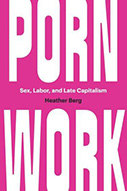Porn Work: Sex, Labor, and Late Capitalism

Author: Heather Berg
Publisher: The University of North Carolina Press, 2021. 256 pages.
Reviewer: Dean Fido ǀ March 2022
Porn Work offers a unique insight into the logistical and lived experiences of 81 individuals within the porn industry — drawing on accounts from performers, managers, and members of casting and filming crews. Across five chapters, Heather Berg enables the reader to understand and engage in a topic area that is rarely discussed to such a full extent, and which seemingly carries a lot of stigma and segregation.
Chapter one – ‘Porn Feels Different Than It Looks’ sets the scene (both literally and figuratively) for the reader by documenting the experiences of porn performers working on a film set. Within, many elements are covered that would be of interest to those working in the psychological sciences. These range from discussions of hierarchy and power among performers, and how this is used to mediate conflict on set, to the way in which some performers feel dehumanised and treated like ‘meat,’ owing to the technical experts trying to obtain the visual outcomes they need. This maps onto a lot of in-depth discussion about the psychological consequences and strains of doing porn work, and how expressing this might lead to poor perceptions of the performers from their peers and future employers.
Chapter two – ‘I Was in Love! And Then It Was Over’ moves the discussion from the performers themselves to the reciprocal relationships they share with their audiences, and the need for their scenes to feel, look, and sound authentic. To this extent, there appears a clear categorisation of performers who are considered to be working for more than just the money, and discussion around the myth that gaining pleasure from sex makes porn feel less like work. Here, ethics are discussed to a great degree, with comments made around the dynamics (and pay) spanning gender, race, and sexuality, and what it means to gain and withdraw consent in the porn industry – as well as the impact that this can have on career progression.
Chapter three – ‘A Scene Is Just a Marketing Tool’ describes and discusses the income that is earned from working in the porn industry, and the need for performers to diversify their income through self-employment elsewhere, such as web-camming and the use of OnlyFans. This chapter is particularly enlightening, as Berg highlights the diversity of skills that are required to succeed in this industry, and how creating a sense of intimacy with audiences can lead to greater income.
Chapter four – ‘I’m Kind of Always Working, but It’s Also Almost Always Really Fun’ continues this discussion, but moves into an assessment of how popularity and increased engagement can impact the performer’s work/life balance, and how this differs from more conventional employment. In this chapter, the positives of marginalised groups becoming self-employed and gaining financial security is pitted against a feeling of needing to always be available, online, and responsive so as to stay relevant and not deter future clients or employers. It is obvious from this chapter that very little is known, by the lay person, about the sheer amount of preparation, upkeep, and administration required from performers in this industry –far exceeding any typical 9 till 5 jobs.
Chapter five – ‘Maybe the State Should Play’ looks at some of the niche comparisons between legislation pertaining to self-employment in this area, and the ethics surrounding developing working policies that directly impact how one protects and treats their own bodies. There is also discussion of between-performer perceptions of the appropriate safety measures that one should follow (such as preventing sexually-transmitted infections), and how the lack of consensus leads to difficulty in regulating the industry.
In summary, this is an excellent read; it surprised me both in regard to the depth of arguments and as to the degree to which lay-knowledge is challenged and developed. The book closes by emphasising the need to better appreciate and understand the views of those in the various roles, and looks to the future evolution of the sex industry.
Dr. Dean Fido, University of Derby, UK


